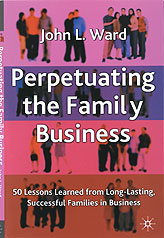| |
 |
| |
John
L. Ward |
| |
|
| |
 |
| |
|
| |
|
| |
|
Faculty
Bookshelf
Kellogg
School family business guru explores best practices in new
text
by
Raksha Varma
Cinical
Professor John
L. Ward has made a career of studying the inner workings
of family businesses. The Kellogg School faculty member's
latest book, Perpetuating the Family Business: 50 Lessons
Learned from Long-Lasting Successful Families in Business,
aims to educate families and non-family executives about best
practices used to meet the challenges facing businesses owned
and operated by families.
Ward,
a veteran author and co-director of the Kellogg Center
for Family Enterprises, is a leading expert in the still-developing
arena of family business. "This is a relatively new field,"
says Ward, who teaches Family
Enterprises: Issues and Solutions at the Kellogg School.
"It's very under-studied. There wasn't much published when
I first began."
After
receiving his MBA and PhD from Stanford University in 1973,
Ward taught at Loyola University and began consulting for
companies. Since 1980, Ward's research has focused on the
strategic differences between family and non-family businesses.
"Along
with most people, I initially did not think family businesses
were effective," Ward says.
After
he later came across a database that demonstrated family businesses
perform exceptionally well, Ward began analyzing the group's
strengths. His research inspired him to write three books:
Keeping the Family Business Healthy; Creating Effective
Boards for Private Enterprises; and Strategic Planning
for the Family Business. He also has authored a collection
of 60- to 80-page booklets, and has contributed his expertise
to trade journals and magazines.
"Historical
evolution is at the heart of my latest book," says Ward, who
used international examples and case studies collected in
the last 10 years for the text. "The family's evolution determines
the complexity and growth of the business."
Ward's
book describes the challenges facing family businesses, common
historical patterns of family business failure by the third
generation, and 50 practical models and lessons.
"One
of the most important principles in my book is to form an
outside board of directors," Ward says. "This action creates
a form where the best interests of the family are explored
with more objectivity and a broader amount of experience."
He also
recommends family businesses have "a diet of regular family
meetings" to discuss the family, its values, vision, challenges
and conflicts.
"Drafting
a family constitution is also a principle I suggest," Ward
says. "Family companies are better off laying out the rules
ahead of time to avoid future problems. Plan to discuss the
exact interaction between the family and business, including
hiring practices and succession processes."
Ward
accents the importance of values to family enterprises. "Unlike
other types of businesses, family-operated businesses emphasize
reputation, continuity and personal values," he explains.
Non-family businesses, especially those impacted by public
shareholders, tend to stress discipline, accountability and
professionalism. Entrepreneurial companies, on the other hand,
underscore innovation, change and creativity.
"It's
important for our society to have a healthy mix of businesses,"
says Ward. "This fuels competition and a dynamic economy.
The United States' economy has relatively fewer family businesses;
international economies tend to include a larger number of
family businesses."
Ward
estimates 25 percent of the U.S. market is composed of family
businesses. Other countries, such as those in Asia, the Middle
East and Latin America, have more because these countries
are at an earlier stage of economic development and lack sophisticated
stock markets. Family businesses are also more widespreadin
these countries, Ward points out, because of prominent differences
in tax policies, legal matters, culture, inheritance and laws.
"The
United States has a completely different mentality and culture,"
Ward says. "Some say it's not wise to mix business with family
here."
Indeed,
some families cannot make decisions, Ward says, because they
view the interests of the business as direct competition to
the interests of the family. The most successful family businesses,
such as Wal-Mart and Cargill, synthesize the "competing" interests
to simultaneously maximize both groups.
"Family
interests and relationships can color business decision-making,"
Ward says. "Families, however, can also bring huge strengths
to businesses. They can make fast decisions and don't feel
the need to impress stock analysts."
Families
who own and operate businesses control the larger percentage
of shares, with the balance occasionally open to public shareholders.
"These families can follow unconventional strategies because
they're usually in this for the long haul, not quick returns."
These families tend to be significant contributors to society,
offer leadership in the community and are long-term risk-takers.
Ward
will continue to research this trend and others, helping shape
the discourse surrounding family businesses. His next booklet
is scheduled for January publication.
For more
information, visit www.JohnLWard.com
|





